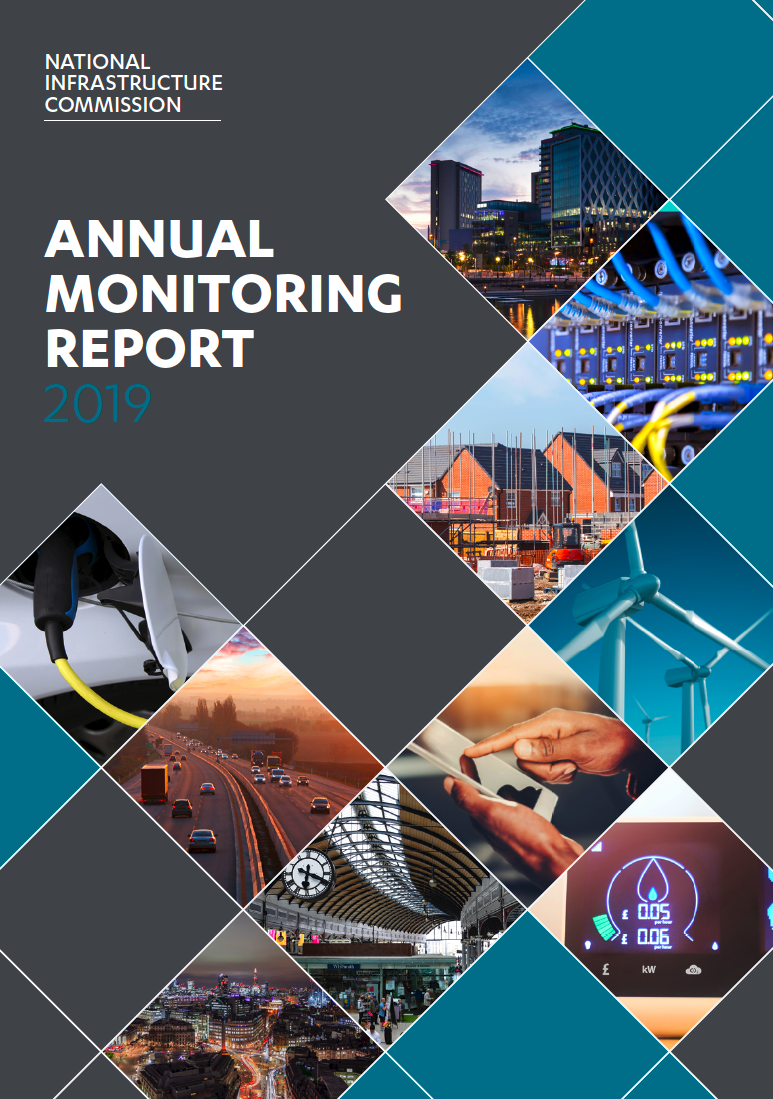
Submitted by Angela Walters on Fri, 22/02/2019 - 09:52
The Centre for Digital Built Britain and the Digital Framework Task Group commended in the National Infrastructure Commission Annual Monitoring Report 2019
The National Infrastructure Commission (NIC) has published its Annual Monitoring Report 2019 in which it names the Centre for Digital Built Britain (CDBB) as key to the development of digital twins:
“CDBB is in a position to develop itself as a centre of excellence and learning for digital twins and should be supported to do so.”
The Centre’s work with the Digital Framework Task Group (DFTG) towards the information management framework leading to the establishment of a National Digital Twin is also highlighted as a Data for the Public Good success.
Established in 2015, the Commission has published six in-depth studies at the request of government, including: Smart Power; Transport for a World City; High Speed North; Connected Future; Partnering for Prosperity; and Data for the Public Good.
In 2018 the Commission published the first National Infrastructure Assessment, an appraisal of the UK’s infrastructure needs up to 2050 setting out the Commission’s plan of action for the country’s infrastructure over the next 10 to 30 years, and awaits the government’s formal response to the Assessment this year in the form of a National Infrastructure Strategy.
The Annual Monitoring Report sets out the Commission’s views on the government’s progress over the past year in response to the six studies.
Alexandra Bolton, Deputy Director of CDBB, said: “I am delighted that the work of CDBB, DFTG and its working groups in creating the Gemini Principles and the soon-to-be-published Roadmap has been recognised in the NIC's Annual Monitoring Report 2019. We are excited to be working with others on the information management framework and pilot studies that will produce the foundations to allow the creation a national digital twin.”
Setting out the Commission’s views on the government’s progress against its commitments over the past year, the Report states the Commission’s priorities for the government over the coming year, presenting chapters for each of the studies to date.
The Report, accompanied by the Annual Monitoring Report 2019: Annex, describes the government’s initial response to the recommendations in the studies as promising, with several programmes of work actioned, including digital infrastructure which has been prioritised by the government in the renamed Department for Digital, Culture, Media and Sport.
Reporting on Data for the Public Good – the Commission’s response to government’s request to identify new technologies that have potential to improve the productivity of the UK’s infrastructure and accompanying steps required of government – the Report states there has been good progress on the recommendations of the study this year, citing the Centre for Digital Built Britain as “in a position to develop itself as a centre of excellence and learning for digital twins and should be supported to do so.”
CDBB’s Digital Framework Task Group (DFTG) is named as an example of progress made:
“The Centre for Digital Built Britain (CDBB) set up a Digital Framework Task Group which has set out a roadmap to an information management framework to set standards and enable interoperability of infrastructure data and models. The overall programme to deliver this is expected to start early this year “
The Infrastructure Client Group (ICG) setting up the Digital Transformation Task Group (DTTG) to report on regulatory barriers and enablers to sharing data, and the UK Regulators Network report into barriers and opportunities in this area, are named as further proof of progress.
In addition, the Report highlights the working group commissioned by the DFTG to consider what programme of work is needed to enable the development of digital twin models, and how government and the private sector can support this work. Citing the good progress of the working group, which has published the CDBB Gemini Principles that explain the definition and uses of digital twins, the Report states:
“Significant progress has been made, driven forward by the DFTG, alongside other key organisations” and called for more momentum behind the digital twin pilot project. It states the key priority for the DFTG is: “to agree funding and governance for the Information Management Framework programme and digital twin pilot project and to begin work on the programme by the end of the year”.
The government has accepted the majority of the recommendations from the Commission’s six studies so far, but the Report states the progress made to deliver them as “mixed”. The Commission has made 45 recommendations in its studies over the past three years, of which 42 were accepted by government, and 10 recommendations, considered complete, closed.
In his Foreword to the Report, Sir John Armitt CBE, Chair National Infrastructure Commission, writes: “The UK can deliver infrastructure well. But government and industry need to work together effectively to do so, with long term planning, stable and realistic budgets and proper governance.
“This will be a critical year. The establishment of the Commission was an important step forward, but a positive response to its National Infrastructure Assessment, and real progress against its wider suite of recommendations, is still needed.”
The government’s progress against the recommendations in each study is set out in more detail throughout this report and in the accompanying annex. This report also sets out the priorities for the coming year for government to deliver their objectives in that area.
• Read the National Infrastructure Commission Annual Monitoring Report 2019 here
• A separate annex provides more detail on the progress against each recommendation.
